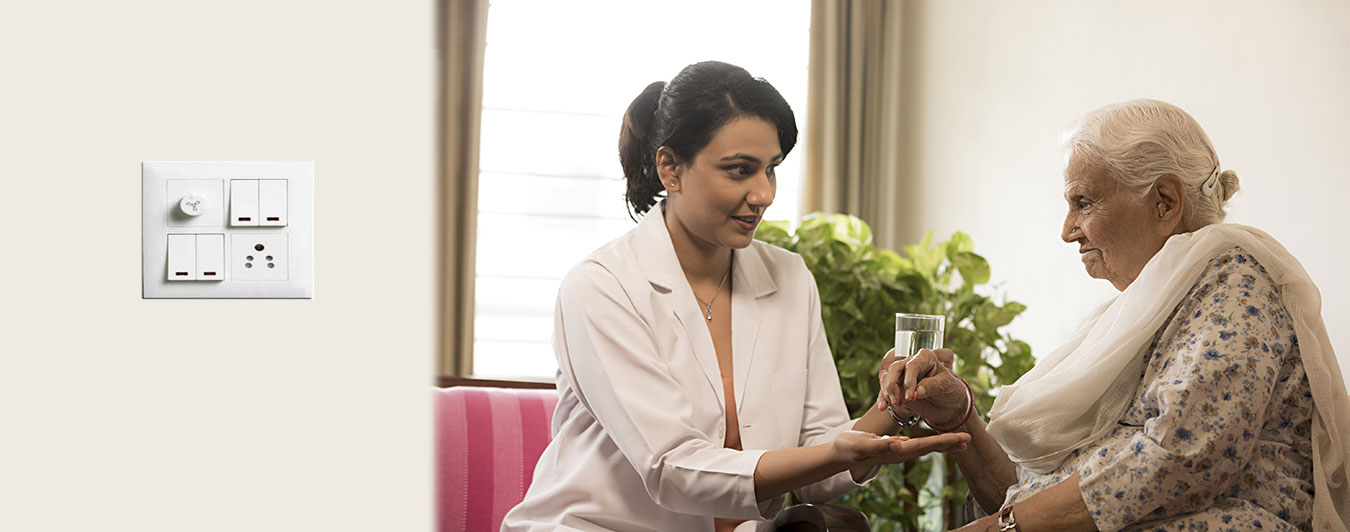The healthcare system in India is transforming rapidly, and with an aging population and an increasing number of chronic illnesses, the demand for home-based care is growing. A Home Health Aide (HHA) is an essential part of this system, offering personalized care to patients in the comfort of their homes. This blog post provides an in-depth look at the role, responsibilities, and skills required to become a Home Health Aide in India.
What is a Home Health Aide?
A Home Health Aide is a trained professional who assists individuals who are unable to fully care for themselves. These aides work in home settings and help patients with their daily living activities, monitor health conditions, and provide companionship. HHAs are vital for patients who prefer to stay at home rather than seek long-term hospital care.

Key Responsibilities of a Home Health Aide
The responsibilities of an HHA go beyond simple caregiving. They encompass a wide range of duties aimed at improving the patient’s quality of life. Below are the core tasks that a Home Health Aide performs:
1. Personal Care Assistance
One of the most critical responsibilities of an HHA is helping patients with personal hygiene. This includes tasks like bathing, grooming, and dressing, especially for individuals who may be bedridden or have mobility challenges.
- Bathing and cleaning patients to ensure they maintain personal hygiene.
- Assisting with grooming activities like combing hair and trimming nails.
- Helping patients get dressed, especially for those with physical disabilities.
2. Nutrition and Meal Preparation
HHAs ensure that patients receive proper nutrition by preparing meals based on dietary guidelines. For instance, a diabetic patient may require meals low in sugar and carbs.
- Preparing meals as per the patient’s dietary needs.
- Helping patients eat if they have difficulty feeding themselves.
- Monitoring food and water intake to prevent dehydration or malnutrition.
3. Elimination Assistance
For patients with mobility challenges, maintaining elimination routines can be difficult. HHAs assist in toileting and continence care while ensuring dignity and privacy.
- Helping patients use the restroom or manage bedpans.
- Changing incontinence pads or assisting with catheter care.
- Monitoring bowel movements and reporting irregularities.
4. Mobility and Positioning
Bedridden patients are at risk of developing pressure sores if not moved regularly. HHAs help patients change positions and provide support for mobility.
- Assisting patients in moving around the house or getting out of bed.
- Helping prevent bedsores by repositioning patients at regular intervals.
- Using equipment like wheelchairs or walkers for patient support.
5. Health Monitoring
HHAs act as the first line of observation for any changes in the patient’s condition. They report these changes to doctors or nurses for further action.
- Measuring vital signs like blood pressure and temperature.
- Noticing changes in physical or emotional health.
- Maintaining logs of daily health observations for healthcare professionals.
6. Infection Control and Housekeeping
Maintaining a clean environment is crucial for a patient’s recovery. HHAs follow strict infection control measures to prevent health risks.
- Cleaning the patient’s living space, including changing bed linens.
- Disposing of biomedical waste like used bandages responsibly.
- Using protective gear such as gloves and masks during caregiving.
Essential Skills of a Home Health Aide
Becoming an effective HHA requires more than just training. Here are the key skills that are indispensable for the role:
1. Compassion and Empathy
HHAs often work with patients who are physically or emotionally vulnerable. Being understanding and compassionate goes a long way in building trust and providing comfort.
2. Strong Communication Skills
Clear communication is essential for coordinating with family members, reporting patient conditions to healthcare providers, and explaining care plans to patients.
3. Attention to Detail
From observing a minor change in health to following a detailed care plan, being detail-oriented ensures nothing is overlooked.
4. Physical Strength and Stamina
Providing physical assistance, such as lifting patients or helping them move, requires good physical health and stamina.
5. Problem-Solving Abilities
Unexpected situations, like a sudden change in the patient’s condition, require quick thinking and the ability to handle emergencies calmly.
Training and Certification for HHAs in India
India offers various training programs for Home Health Aides under the National Skills Qualifications Framework (NSQF) Level 3. These programs are designed to equip aspiring HHAs with the knowledge and practical skills needed for the job.
Core Modules Include:
- Basics of human anatomy and physiology.
- Understanding nutrition and dietary requirements.
- Techniques for patient movement and body mechanics.
- Personal hygiene and infection control practices.
- Emergency response, including basic first aid.
Why Choose a Career as a Home Health Aide?
With a growing demand for home healthcare services, HHAs have excellent job prospects in India. The role is fulfilling, allowing you to make a significant impact on patients' lives while gaining valuable experience in the healthcare field. Additionally, it offers opportunities for career growth into roles like Nursing Assistant or Home Care Supervisor.
Conclusion
The role of a Home Health Aide is vital in India’s healthcare ecosystem. By providing compassionate care, assisting with daily activities, and ensuring patients’ safety, HHAs play a critical role in improving the quality of life for those in need. If you are passionate about helping others and want to pursue a meaningful career, becoming an HHA might be the perfect choice for you!